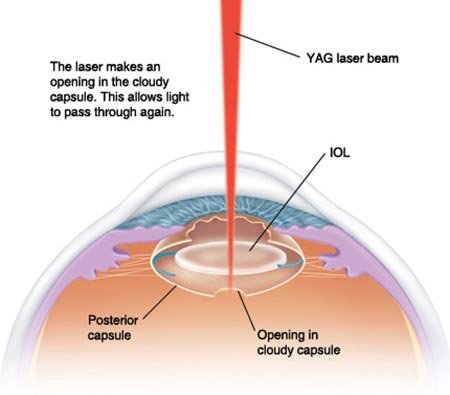CATARACT YAG Capsulotomy Single Eye
India
-
Our Price USD 257
-
Hospital Price USD 270
-
You Save : USD 14
Booking Amount: USD 26. Pay Remaining 90% at the hospital.
Book NowAdditional Credit
Among the important extras we offer as part of the Additional Credit are the following:
-
Site Tourism For The Patient & Attendant
-
Airport Pick & Drop Service
-
Ambulance service at airport
-
Priority appointments with The Doctor
-
Cancel Easily Anytime with Full Refund
-
Room Upgradation
-
Free Online Doctor Consultation Valued at USD 20
-
Free hotel Stay for 5 to 7 days Accordingly
-
Welcome Kit at Arrival
-
Interpreter
-
Medical Visa Assistance
What is Included?
- Doctor consultation charges
- Lab tests and diagnostic charges
- Room charges inside hospital during the procedure
- Surgeon Fee
- Cost of implant
- Nursing charges
- Hospital surgery suite charges
- Anesthesia charges
- Routine medicines and routine consumables (bandages, dressings etc.)
- Food and Beverages inside hospital stay for patient and one attendant.
What is not Included?
- Extra Radiology Investigations
- Healthcare Professionals Charges of other consultations.
- Other Requested Services such as Laundry etc.
- Additional Pharmaceutical Products and Medicines After Discharge from Hospital.
- Management of Conditions Unrelated to Procedures or Pre-Existing.
- The cost of any additional implants will be in addition to the package cost.
Package Description
CATARACT YAG Capsulotomy :
Cataract surgery involves removing the clouded natural lens of the eye and replacing it with an intraocular lens, which is an artificial lens (IOL). Cataract is not an illness, but rather an age-related condition. The most prevalent cause of cataract is advanced age. Age-related cataracts are also known as senile cataracts.
YAG laser capsulotomy is a procedure that improves your vision following cataract surgery. Your eyesight may get blurry months or years after cataract surgery, necessitating this operation. This occurs when the posterior capsule, a membrane in your eye, becomes clouded.
Before conducting a YAG laser in patients with adverse effects including fuzzy vision, glare, or halos, wait at least three months after cataract surgery.
Disease Overview:
A cataract is a clouding of the lens of the eye, which is ordinarily clear. Seeing through hazy lenses is similar to looking through a frosty or fogged-up window for persons with cataracts. Cataracts can make it difficult to read, drive a car (particularly at night), or notice the expression on a friend's face due to clouded vision.
The majority of cataracts form slowly and do not affect your vision at first. Cataracts, on the other hand, will obstruct your eyesight over time.
Stronger lighting and spectacles might help you cope with cataracts at first. However, if your vision is obstructing your daily activities, you may need cataract surgery. Cataract surgery is, fortunately, a relatively safe and successful technique.
Disease Signs and Symptoms:
Cataracts can cause the following signs and symptoms:
- Vision that is clouded, hazy, or dull
- Night vision is becoming increasingly challenging.
- Light sensitivity and glare
- For reading and other tasks, a stronger light is required.
- Seeing "halos" surrounding lights is a common occurrence.
- Changes in eyeglass or contact lens prescriptions on a regular basis
- Color fading or yellowing
- In one eye, there is double vision.
At initially, the cloudiness caused by a cataract may only impact a tiny portion of your vision, and you may be completely unaware of any vision loss. The cataract swells in size, clouding more of your lens and distorting the light travelling through it. It's possible that this will result in more obvious symptoms.
Disease Causes
The most common cause of cataracts is a change in the tissue that makes up the lens of the eye due to age or injury. The lens' proteins and fibres begin to break down, giving blurry or unclear vision.
Cataracts can be exacerbated by inherited genetic abnormalities that cause other health issues. Other eye diseases, previous eye surgery, or other disorders such as diabetes can all induce cataracts. Long-term usage of steroid medicines can also lead to cataracts.
The formation of a cataract
A clouded lens is referred to as a cataract. The lens sits behind the coloured portion of your eye (iris). The lens concentrates light entering your eye, resulting in crisp, sharp pictures on the retina (the light-sensitive membrane in your eye that operates similarly to the film in a camera.
The lenses in your eyes get less flexible, less translucent, and thicker as you get older. Proteins and fibres within the lenses break down and clump together as a result of ageing and other medical disorders, clouding the lenses.
The cloudiness grows heavier as the cataract progresses. As light passes through the lens, a cataract scatters and blocks it, preventing a highly defined image from reaching your retina. As a result, your eyesight will get hazy.
Cataracts usually develop in both eyes at the same time, although not always. One eye's cataract may be more advanced than the other, resulting in a disparity in vision between the two.
Cataracts are classified into several categories.
Cataracts that damage the centre of the lens are one form of cataract (nuclear cataracts). At initially, a nuclear cataract may induce increased nearsightedness or even a transient improvement in reading vision. However, as time passes, the lens becomes more thickly yellow, obscuring your eyesight even more.
The lens may even become brown as the cataract advances. Advanced lens yellowing or browning can make it difficult to discriminate between different tones of colour.
Cataracts that impair the lens's edges (cortical cataracts). The first signs of a cortical cataract are white, wedge-shaped opacities or streaks on the lens cortex's outer border. The streaks gradually expand to the centre of the lens, interfering with light flowing through the centre.
Cataracts that impair the lens's rear surface (posterior subcapsular cataracts). A posterior subcapsular cataract begins as a tiny, opaque patch near the rear of the lens, directly in the light path. A posterior subcapsular cataract can create glare or halos surrounding lights at night, interfere with reading vision, and impair vision in bright light. These forms of cataracts develop more quickly than others.
You are born with cataracts (congenital cataracts). Some people are born with cataracts, while others get them later in life. These cataracts might be hereditary, or they could be the result of an intrauterine illness or trauma.
Certain diseases, such as myotonic dystrophy, galactosemia, neurofibromatosis type 2 or rubella, can cause cataracts.
Congenital cataracts don't often cause visual problems, but if they do, they're typically removed as soon as they're discovered.
Risk Factors
Cataracts are caused by a number of factors, including:
- Getting older
- Diabetes
- Excessive sunlight exposure
- Smoking
- Obesity
- Blood pressure that is too high
- Inflammation or damage to the eyes previously
- Previous ophthalmic surgery
- Use of corticosteroid medicines for a long time
- Excessive use of alcoholic beverages
Disease Diagnosis:
Your doctor will examine your eyes and analyse your medical history and symptoms to determine if you have a cataract. Several tests may be performed by your doctor, including:
Acuity test of the eyes. An eye chart is used to assess how well you can read a succession of letters in a visual acuity exam. One of your eyes will be checked at a time while the other is covered. Your eye doctor assesses if you have 20/20 vision or if you have symptoms of impairment using a chart or a viewing gadget with increasingly smaller letters.
Examination using a slit light. Your eye doctor can use a slit light to magnify the structures at the front of your eye.
The microscope is called a slit lamp because it illuminates your cornea, iris, lens, and the area between your iris and cornea with a strong line of light called a slit. The incision allows your doctor to examine these structures in small pieces, making it simpler for him or her to see any minute abnormalities.
Exam of the retina. Your eye doctor will place drops in your eyes to widen your pupils in preparation for a retinal test (dilate). Examining the back of your eyes becomes easy as a result of this (retina). Your eye doctor can inspect your lens for indications of a cataract using a slit lamp or a special gadget called an ophthalmoscope.
Tonometry through applanation. The fluid pressure in your eye is measured using this test. There are a variety of gadgets to choose from.
Disease Treatment
Cataract surgery is the only effective therapy for cataracts when your prescription glasses are no longer able to clear your vision.
When should cataract surgery be considered?
Consult your eye doctor to see if surgery is appropriate for you. When your cataracts begin to compromise your quality of life or interfere with your ability to do routine everyday activities like reading or driving at night, most eye physicians recommend contemplating cataract surgery.
When cataract surgery is appropriate for you, it is up to you and your doctor to decide. Most individuals do not rush to get cataracts removed because they normally do not affect their eyes. However, cataracts can worsen more quickly in those who have diabetes, high blood pressure, or obesity.
If you decide to undergo cataract surgery later, delaying the treatment won't effect how well your eyesight improves. Take the time to discuss the advantages and disadvantages of cataract surgery with your doctor.
If you decide not to have cataract surgery right away, your eye doctor may advise you to have regular check-ups to assess how your cataracts are going. The frequency with which you visit your eye doctor is determined by your circumstances.
surgery to remove cataracts
The clouded lens is removed and replaced with a clear prosthetic lens during cataract surgery. The intraocular lens, or artificial lens, is placed in the same spot as your natural lens. It will always be a part of your eye.
Other eye disorders prevent some people from wearing an artificial lens. After the cataract is removed, eyesight can be repaired using eyeglasses or contact lenses in certain cases. Cataract surgery is usually performed as an outpatient procedure, which means you won't have to stay in the hospital afterward. Your eye doctor will use a local anaesthetic to numb the region surrounding your eye during cataract surgery, but you will normally remain awake.
Cataract surgery is typically safe, however infection and bleeding are possible after effects. Retinal detachment is more likely after cataract surgery.
For a few days after the surgery, you will be in pain. In most cases, healing takes a few weeks.
If you require cataract surgery in both eyes, your doctor will arrange surgery to remove the cataract in the second eye once the first has recovered.
Information related to Treatment
Package Details
Days in Hospital
1 Days
Days in Hotel
*
5 Days
Room Type
Private
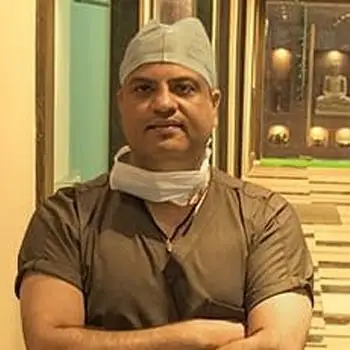
Treating Doctor
Dr. Suraj Munjal
Ophthalmologist- Retina Surgeon, Cataract Surgeon, Lasik surgeon, Vitreo Retina Surgeon, Eyelid Surgery, Trabeculectomy, Vitreoretinal Surgery, Orbital & Oculoplastic surgery, Refractive surgery, Retina Examination, Glaucoma Evaluation / Treatment, Canaloplasty, Corneal Surgery, Eye Muscle Surgery, Orbital Surgery, Anterior Segment Surgery, Orbital Decompression Surgery for Thyroid Eye Disease, Orbital Trauma, Diabetic Retinopahy, YAG laser Posterior Capsulotomy, Anterior Retinal Cryotherapy, Retinal Surgery, Lens for Keratoconus
The Sight Avenue Eye Hospital Delhi, India
19 Years of Experience
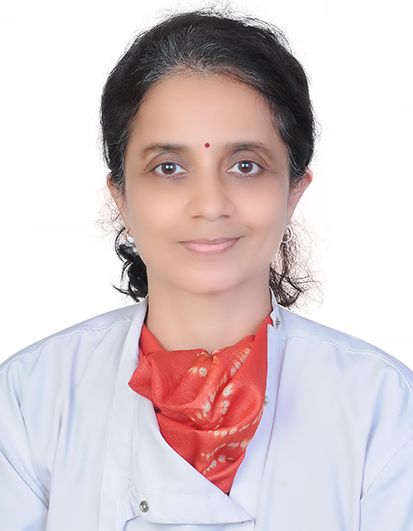
Treating Doctor
Dr. Sushama Ramchandani
Ophthalmologist- Cataract Surgeon
Center For Sight, Navi Mumbai, Mumbai Mumbai, India
29 Years of Experience
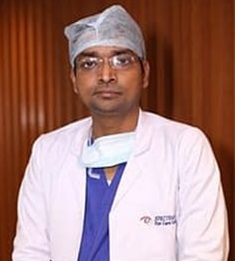
Treating Doctor
Dr. Md. Ali Mosharraf
Ophthalmologist- Cataract Surgeon, Lasik surgeon, Glaucoma Specialist, Ocular Oncology, Cataract treatment, Eye Checkup - General, Phakic OIL Implantation, Cornea Transplant, Treatment for Keratoconus
The Sight Avenue Eye Hospital Delhi, India
19 Years of Experience

Treating Doctor
Dr. Rashmi Saraff
Ophthalmologist- Retina Surgeon, Cataract Surgeon, Neuro-ophthalmologist, UVEA
Center For Sight, Rabindra Sadan, Kolkata Kolkata, India
20 Years of Experience

Treating Doctor
Dr. Abhilasha Baharani
Ophthalmologist- Cataract Surgeon, Coronary imaging like IVUS and OCT, UVEA, Flourescein Angioplasty, Phacoemulsification
Center For Sight, Nampally, Hyderabad Hyderabad, India
12 Years of Experience

Treating Doctor
Dr. Keshab Haldar
Ophthalmologist- Cataract Surgeon, Lasik surgeon, Refractive surgery, Oculoplasty, Corneal Surgery, Refractive surgery, Treatment for Keratoconus
Center For Sight, Rabindra Sadan, Kolkata Kolkata, India
25 Years of Experience

Treating Doctor
Dr. Dipangshu Basu Chaudhuri
Ophthalmologist- Cataract Surgeon, Glaucoma Specialist
Center For Sight, Rabindra Sadan, Kolkata Kolkata, India
21 Years of Experience

Treating Doctor
Dr. Debasis Chakrabarti
Ophthalmologist- Laser Surgeon, Cataract Surgeon, Lasik surgeon, Glaucoma Specialist, Eyelid Surgery, Eye Checkup - General, Corneal Surgery, Oculoplastic Surgery
Center For Sight, Rabindra Sadan, Kolkata Kolkata, India
17 Years of Experience
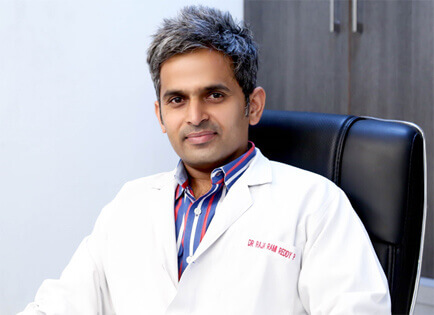
Treating Doctor
Dr. Raja Rami Reddy
Ophthalmologist- Cataract Surgeon, Lasik surgeon, Vitreo Retina Surgeon, LASER surgery, Refractive surgery, Corneal Surgery, Orbital Surgery, Anterior Segment Surgery, Orbital Decompression Surgery for Thyroid Eye Disease, Retinal Surgery, Refractive surgery
Center For Sight, Nampally, Hyderabad Hyderabad, India
22 Years of Experience

Treating Doctor
Dr. Varun Malhotra
Ophthalmologist- Cataract Surgeon, Lasik surgeon, SMILE Surgeon, Ocular Oncology, Refractive surgery, Cornea treatment, Cornea treatment, Cornea treatment, Refractive surgery, Treatment for Keratoconus
Center For Sight, Nampally, Hyderabad Hyderabad, India
15 Years of Experience

